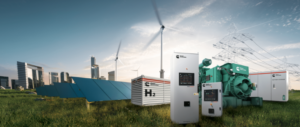Hydrogen Fuel Cells: Engineering Cleaner Energy Systems
Hydrogen fuel cells are an innovative and sustainable technology that offers a promising alternative to fossil fuels. By leveraging the abundant resource of hydrogen, these systems provide clean and efficient energy for a variety of applications.
How Do Hydrogen Fuel Cells Work?
At the heart of a hydrogen fuel cell is an electrochemical process that converts hydrogen and oxygen into electricity, with water and heat as byproducts. The process includes:
- Hydrogen Input: Hydrogen gas (H₂) is supplied to the anode of the fuel cell.
- Electrochemical Reaction:
- At the anode, hydrogen molecules split into protons (H⁺) and electrons (e⁻).
- The electrolyte membrane allows only the protons to pass through to the cathode, forcing the electrons to travel through an external circuit, creating an electric current.
- Oxygen Combination: At the cathode, oxygen (O₂) reacts with the incoming protons and electrons, forming water (H₂O).
This clean energy process emits no pollutants—only water vapor.
Advantages of Hydrogen Fuel Cells
- Environmental Benefits:
- Zero carbon emissions during operation.
- Water is the only byproduct, making it environmentally friendly.
- Energy Efficiency:
- Fuel cells are highly efficient compared to combustion engines, especially for electricity generation.
- Versatility:
- Hydrogen can be produced from a variety of sources, including renewable energy, enabling energy independence.
- Applications Across Sectors:
- From powering vehicles to stationary power systems and portable devices, fuel cells are adaptable to diverse needs.
- Quick Refueling:
- Unlike battery-powered systems, hydrogen fuel cells refuel quickly, offering a practical solution for heavy-duty transport.
Key Applications of Hydrogen Fuel Cells
- Transportation:
- Fuel cell electric vehicles (FCEVs) such as cars, buses, and trucks offer long ranges and short refueling times, making them ideal for long-distance travel and commercial transport.
- Stationary Energy Systems:
- Backup power for critical facilities like hospitals, data centers, and telecommunication towers.
- Energy supply for remote or off-grid areas.
- Industrial Use:
- Hydrogen-powered forklifts and machinery are increasingly used in industries for their efficiency and environmental benefits.
- Portable Devices:
- Fuel cells power drones, portable generators, and specialized equipment in defense and disaster relief scenarios.
Challenges and Solutions
- Production of Hydrogen:
- Current methods often rely on natural gas, which produces CO₂.
- Solution: Focus on green hydrogen production through water electrolysis powered by renewable energy sources.
- Infrastructure:
- A lack of widespread hydrogen refueling stations hinders adoption.
- Solution: Governments and industries are collaborating to expand hydrogen infrastructure globally.
- Cost:
- Fuel cells require expensive materials like platinum for catalysts.
- Solution: Advancements in material science and economies of scale are driving down costs.
The Future of Hydrogen Fuel Cells
Hydrogen fuel cells hold immense potential to revolutionize energy systems, contributing significantly to global decarbonization efforts. As technology advances, costs decline, and infrastructure improves, fuel cells are expected to play a vital role in achieving cleaner and more sustainable energy systems worldwide.
Let me know if you’d like to dive deeper into any specific area!

Also Read :
- Hydrogen Fuel Cells: Engineering Cleaner Energy Systems
- Autonomous Vehicles: The Engineering Challenges and Innovations
- The Impact of 3D Printing on Biomedical Engineering
- Engineering the Future: Insights from Our Research on agriculture catastrophe
- Exploring AI-Driven Optimization in Civil Engineering
